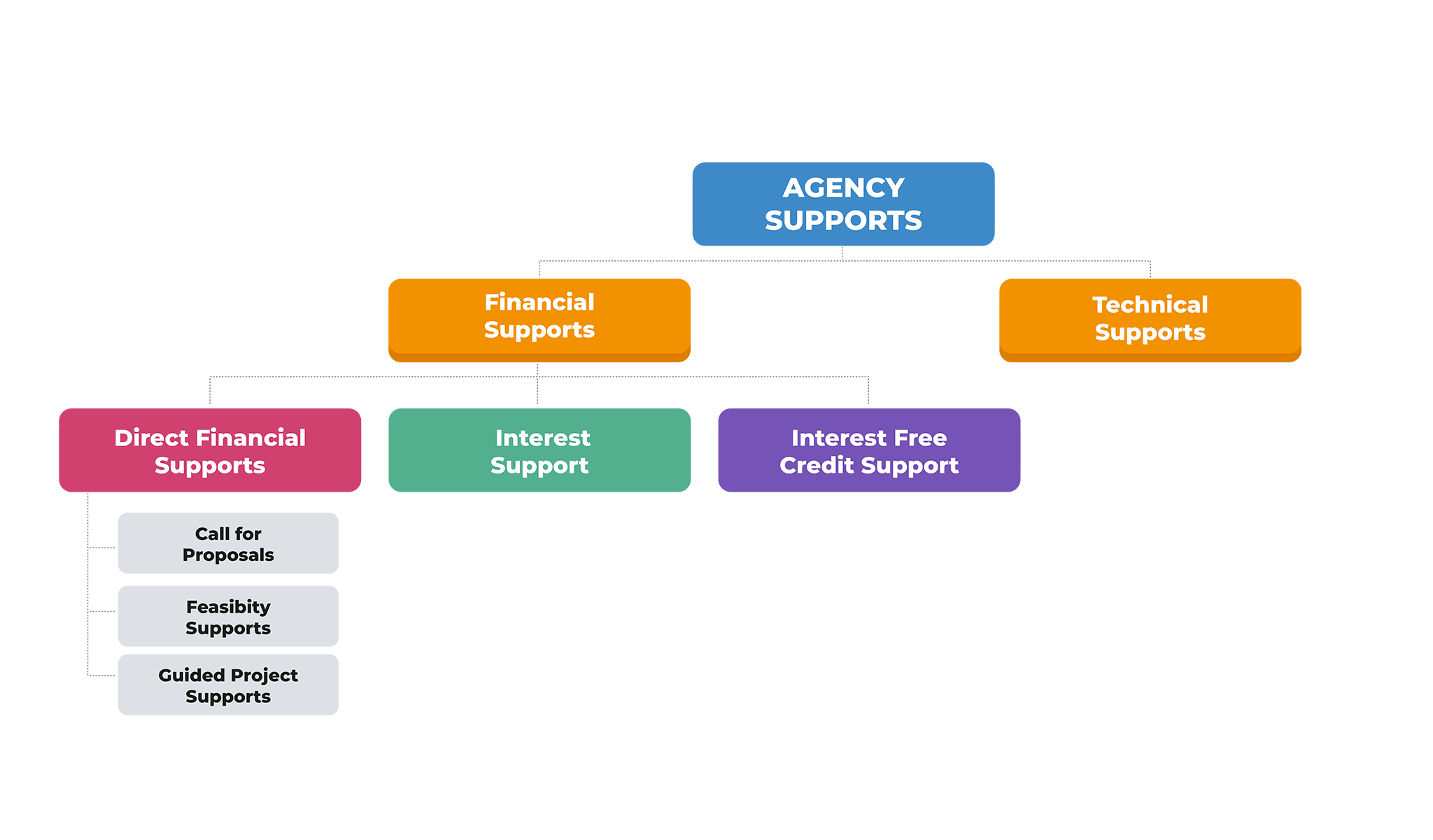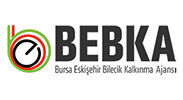Development Agencies provide financial and technical support to regional actors in the areas determined in the regional plan and programs, annual work program and relevant guidance in order to accelerate the development process of the region and implement activities of critical importance for the region regarding pre-determined eligibility criteria.
Agency, provided that it is clearly stated in the annual work program and guidance; provides financial support to the projects of enterprises, non-governmental organizations, public institutions and organizations, universities, local governments and their unions, cooperatives and their unions and other real and legal persons. The agency can provide financial support in 3 different ways; direct financial support, interest support and interest-free credit support.

- Calls For Proposals
- Feasibility Study Support
- Technical Support
- Guided Project
Support - Interest Support
and Interest-Free
Credit Support
What is call for proposals?
It is the invitation of potential applicants, whose qualifications have been determined in the guidance, to submit a proposal in accordance with the pre-determined subject and conditions, within the scope of a specific support program carried out by the Agency.
What are the funding rules?
The maximum and minimum amount of financial support that can be given per project by the Agency may differ according to the specific conditions of the grant program. While determining these limits, factors such as the general aims and objectives of the program, the nature of potential applicants, the eligible project subjects and costs, and the program budget are taken into account.
How to apply?
The application form and conditions during the call for proposals are published in detail on the Agency’s website.
Who can apply?
Public institutions and organizations, non-governmental organizations, universities, local governments, unions, cooperatives and profit-oriented enterprises that meet the criteria to be determined specifically for each call for proposals and the eligibility conditions in the “Development Agencies Project and Activity Support Regulation” canapply.
What Types of Activities are Supported by the Agency?
- Projects and activities that assist in the implementation of regional plans and programs.
- Projects and activities that contribute to the development of the region’s rural and local development capacity in accordance with regional plans and programs.
- Projects that improve cooperation between public sector, private sector and non-governmental organizations
- All kinds of strategy and plan studies, research, examinations and studies aimed at identifying the resources and opportunities of the region, accelerating economic and social development, increasing the competitiveness and innovation capacity, and increasing the impact and effectiveness at the national and international level.
- Projects and activities for the promotion and development of business and investment opportunities in the region.
- Projects and activities that will directly or indirectly support small and medium-sized enterprises and new entrepreneurs in subjects such as management, production, promotion, marketing, technology, finance, organization and workforce training.
- Projects and activities that enable the promotion of activities related to bilateral or multilateral international programs that Turkey participates in, and contribute to project development and resource procurement within the scope of these programs.
- Projects and activities aimed at improving the project production and implementation capacity of institutions and organizations in the region, increasing their quality in service delivery, and developing human resources and institutional infrastructures.
Within the scope of the call for proposals, free project writing training are organized on topics such as how projects should be prepared and the logical framework approach according to project cycle management
The contents of the project writing training are presented in audio and animated form on the website of the Agency. Those who do not have the opportunity to attend the project writing training meetings or who want to refresh their knowledge can also benefit from the online project writing training software.
What is feasibility study support?
It is the direct financial grant given by the agency to the feasibility studies of projects aimed at benefiting from important opportunities for the development and competitiveness of the region, preventing threats and risks to the regional economy, and improving the innovation and entrepreneurship capacity of the region.
Who can apply?
- Local Governments
- Universities
- Public Institutions And Organizations
- Non-Governmental Organizations
- Organized Industrial Zones
- Small Industrial Sites
- Technoparks, Technology Development Zones, Industrial Zones, Business Development Centers
- Unions And Cooperatives
How to apply? What are the funding rules?
This type of support is not carried out via calls for proposals method. In this type of support, Agency support cannot exceed twice the limit determined every year in accordance with paragraph f of Article 21 of the Public Procurement Law No. 4734. The agency includes areas to be supported within the scope of feasibility study support in its work program. Co-financing of the beneficiary is not obligatory in feasibility supports. However, activity proposals that envisage co-financing are primarily supported. Each proposal, which will be prepared in accordance with the determined procedures and submitted to the agency, is evaluated by an evaluation commission of at least three people, which will be composed of experts from the Agency under the chairmanship of the Secretary General, within a maximum of one month from the date the application reaches the agency, and submitted to the approval of the Board of Directors. Project proposals are evaluated with priority by the Board of Directors and are resolved at the first meeting to be held after the evaluation results are presented to the Board of Directors.
Which subjects are eligible?
The proposal submitted within the scope of feasibility study support must comply with at least one of the following criteria:
- It should be aimed at benefiting from important opportunities in terms of economic and social development and competitiveness of the region.
- It should contribute to the prevention of threats and risks to the regional economy.
- It should aim to develop the innovation and entrepreneurship capacity of the region.
Within the scope of feasibility study support, the beneficiary must complete the contractual obligations within a maximum of one year and submit the feasibility study to the agency. The implementation period starts one day after the signing of the contract.
What is Technical Support?
It is the type of support provided to institutional and capacity-building activities such as providing training, contributing to the preparation of programs and projects, assigning temporary expert personnel, providing consultancy, lobbying activities and establishing international relations contributing to local and regional development. The agency implements this type of support within the framework of its current possibilities, by its own personnel or through outsourcing.
Who Can Apply?
- Local Governments and Local Government Associations,
- Public Institutions and Organizations,
- Non-Governmental Organizations,
- Organized Industrial Zones,
- Small Industrial Sites,
- Technology Development Zones (Technoparks And Technoparks),
- Technology Transfer Office Companies,
- Industrial Zone Management Companies,
- Business Development Centers,
- Unions and Cooperatives,
- Free Zone Operators,
- Other Profit-Oriented Real and Legal Persons
How to Apply?
Guidance for technical support, including eligible participiants, activities and the application method is announced on the Agency website which Proposals are accepted in two-month periods and evaluated within 15 working days following the acceptance period. After the commission report is approved by the Secretary General, the projects to be supported are announced on the Agency website.
What are the funding rules?
No direct financial support is provided to the Applicants in this program. Requested Technical Support is provided by the Agency directly or through outsourcing. In case the support is provided through outsourcing; the total cost of each technical support to the agency cannot exceed the limit determined every year for the administrations within the borders of the metropolitan municipality in subparagraph d of the first paragraph of the Article 22 of the Public Procurement Law No. 4734. No cash contribution is requested from the beneficiary institution in technical support activities. However, the necessary study materials, training, and the expenses for the organization of the workshop are provided by the beneficiary institution or its partner in order to carry out the technical support activities.
How long is the duration of projects?
The implementation period of each technical support provided by the Agency through its own personnel or outsourcing is six months after the contract is signed. Implementation period of technical support activities that cannot be -completed in six months despite being approved due to high demand, density or other reasons; may be extended by the General Secretariat for a maximum of one month, taking into account the agency’s workload, expert profile and work schedule.
Which activities are eligible?
The Agency can support the activities of local governments to implementregional plans and programs or increasing local development capacity, and other applicants’ work that can contribute to local and regional development.
Eligible organizations for technical support, the scope, application conditions and evaluation criteria are determined by the agency and announced on the agency’s website.
What is a Guided Project?
Guided projects are special model projects determined by and under the leadership and direction of the Agency in line with the priorities foreseen in the regional plan without applying the call for proposals method. The Agency may provide support for guided projects whose feasibility studies of proposals have been approved by the Ministry.
The general purpose of the projects to be supported with this type of support is as follows:
- In a way that strengthens private sector management; development of production and export capacity, creation of good practice examples, support of sectoral specialization, development, transfer or dissemination of special knowledge, skills and technologies, development of new financing models, support of public-university-industry cooperation, development of new service and production organizations, cooperation networks and creating a value chain, supporting clusters.
- In a way that strengthens social solidarity and sense of responsibility, protect and develop cultural values; establishing the infrastructure that will facilitate the access of disadvantaged groups to social, cultural and physical services; it is essential to prevent the negative effects of migration, to facilitate social life, and to keep the intangible cultural heritage alive.
Who can Apply? How to Apply?
Cooperation between public, private sector and non-governmental organizations is encouraged in order to ensure that the projects are owned by the stakeholders and to increase the efficiency in the implementation process. In guided project supports, only profit-oriented organizations cannot be project implementers, except for companies that pursue a certain degree of public interest, such as the Technology Development Zone Management Company, or companies whose controlling partners are public institutions. However, profit-oriented institutions and organizations can become partners or associates within the scope of guided project support.
What are the funding rules?
The Agency can provide grants for guided projects up to seventy-five percent of the total project cost. This rate can be increased up to a maximum of 90% with the approval of the Board of Directors. In guided projects, it is essential that the project partners also provide co-finance and make commitments to ensure the sustainability of the project.
Which Activities Cannot Be Supported?
- All kinds of investments of local administrations in rural infrastructure and non-model or non-innovative construction works such as common local roads, drinking water, sewerage, treatment, rain water, health center, cultural center, sports facility, social service buildings, which are routinely performed by local administrations.
- Projects that included in the public investment program.
- Projects in which profit-oriented organizations are beneficiaries, with the exception of the companies mentioned above.
- Projects with ownership, permit, zoning, partnership and similar legal and technical obstacles.
What is Interest Support?
It is the financial support for the projects to be paid by the Agency for the loans to be received from the related intermediary institutions for the projects specified in the program guide.
What is Interest-Free Credit Support?
Interest-free credit support is the financial support that the agency will provide for projects which comply with the application guide, by providing interest-free loans through intermediary institutions.
How to Apply?
In the program guides regarding the calls for proposals for interest support or interest-free credit support to be prepared by the Agency; matters such as the contracted intermediary institutions, the duration of the loan agreement to be made between the beneficiary and the relevant intermediary institution, the types, limits and maturities of the loans to be supported, the maximum amount of support to be provided by the agency, the time of repayment of interest and principal, and the benefits and payment conditions are clearly stated.
How Does the Interest-Free Credit Support Process Work?
In interest-free credit support, the beneficiary is granted a grace period of at least six months from the date of the contract and the repayments are completed within a maximum of three years from the date of the contract.
What are the Important Issues Regarding Financial Supports?
- The applications of the applicants which do not have a signed and stamped loan eligibility letter among the application documents or who cannot document that they have made a loan eligibility application to the relevant intermediary institution until the delivery date of the project for the applications whose loan request has not been finalized yet, are rejected at the preliminary evaluation stage. The loan eligibility requests of the applicants who apply to the agency with the loan eligibility application letter given from the relevant intermediary institution instead of the loan acceptance letter are finalized within the period specified in the application protocols. Applications for which loan requests are deemed appropriate are notified to the agency by the intermediary institution. Applications with negative credit eligibility requests are not included in the independent evaluation process and are rejected.
- The commissions and expenses paid by the applicants who request bail from the Credit Guarantee Fund for the services rendered by the said fund are considered as ineligible costs.
- The credibility assessment regarding the financial management risks and capacities of the beneficiaries is made by the relevant intermediary institutions within the framework of their own legislation and practices.
- The technical evaluation of the projects in terms of their compliance with plans and programs and other development policies and tools and their contribution to local development is made by the agency within the framework of the evaluation process specified in the legislation.
- An electronic system is established between the agency and the relevant intermediary institutions to monitor the implementation processes of the support.
- The provisions of the Project Implementation Guide do not apply to the procurement procedures within the scope of the project.
- When the credit debt of the beneficiary ends in the financing support, the limitations on ownership specified in Article 43 of this Regulation are not imposed any longer.
- Provisions regarding the obligation to obtain collateral specified in the regulation are not applicable.
- Provisions related to dissemination rules do not apply in financing support.
Proje teklif çağrısı kapsamında, projelerin nasıl hazırlanması gerektiği, proje döngüsü yönetimi ve mantıksal çerçeve yaklaşımı gibi konuların ele alındığı ücretsiz proje yazma eğitimleri düzenlenmektedir.
Proje yazma eğitimleri içerikleri ayrıca online olarak web sitemiz üzerinden sesli ve animasyonlu olarak sunulmaktadır. Proje yazma eğitim toplantılarına katılma fırsatı bulamayan yada bilgilerini pekiştirmek isteyenler online proje yazma eğitimi yazılımından da yararlanabilirler.








